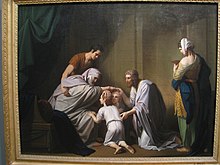Ephraim
Ephraim | |
|---|---|
| אֶפְרַיִם | |
 Ephraim, son of Joseph (1843) by Francesco Hayez | |
| Born | 2200 AM (c. 1560 BC) |
| Died | unknown |
| Parents | |
| Relatives | |
Ephraim (/ˈiːfriːəm/;[1] Hebrew: אֶפְרַיִם ʾEp̄rayīm, in pausa: אֶפְרָיִם ʾEp̄rāyīm) was, according to the Book of Genesis, the second son of Joseph ben Jacob and Asenath, as well as the adopted son of his biological grandfather Jacob, making him the progenitor of the Tribe of Ephraim. Asenath was an Ancient Egyptian woman whom Pharaoh gave to Joseph as wife, and the daughter of Potipherah, a priest of ʾĀwen.[2] Ephraim was born in Egypt before the arrival of the Israelites from Canaan.[3]
The Book of Numbers lists three sons of Ephraim: Shuthelah, Beker, and Tahan.[4] However, 1 Chronicles 7 lists eight sons, including Ezer and Elead, who were killed in an attempt to steal cattle from the locals. After their deaths he had another son, Beriah.[5] He was the ancestor of Joshua, son of Nun ben Elishama, the leader of the Israelite tribes in the conquest of Canaan.[6]
According to the biblical narrative, Jeroboam, who became the first king of the Northern Kingdom of Israel, was also from the house of Ephraim.[7]
Biblical criticism[edit]

The Book of Genesis related the name "Ephraim" to the Hebrew root פָּרָה (pārā), meaning "to be fruitful".[8] This referring to Joseph's ability to produce children, specifically while in Egypt (termed by the Torah as the land of his affliction).[9] The name Ephraim can therefore be translated as "I will be fruitful", with the prefix of aleph (א) indicating the first person, singular, future tense.[10]
In the biblical account, Joseph's other son is Manasseh, and Joseph himself is one of the two children of Rachel and Jacob, the other being Benjamin.
In the Torah, the eventual precedence of the tribe of Ephraim is argued to derive from Jacob, half blind and on his deathbed, blessing Ephraim before Manasseh.[9][11] The text describing this blessing features a hapax legomenon – the word שכל (sh-k-l) – which classical rabbinical literature has interpreted in esoteric manners;[12] some rabbinical sources connect the term with sekel, meaning mind/wisdom, and view it as indicating that Jacob was entirely aware of who he was actually blessing;[11] other rabbinical sources connect the term with shikkel, viewing it as signifying that Jacob was despoiling Manasseh in favour of Ephraim;[11] yet other rabbinical sources argue that it refers to the power of Jacob to instruct and guide the holy spirit.[11] In classical rabbinical sources, Ephraim is described as being modest and not selfish.[12]
See also[edit]
References[edit]
- ^ "Ephraim". Merriam-Webster.com Dictionary.
- ^ Genesis 41:50–52
- ^ Genesis 48:5
- ^ Numbers 26:35
- ^ 1 Chronicles 7:20–23
- ^ 1 Chronicles 7:20–27
- ^ 1 Kings 11:26
- ^ "Strong's Hebrew Concordance - 6509. parah".
- ^ a b Genesis 41:52
- ^ "Conjugation of לִפְרוֹת". Pealim.
- ^ a b c d Genesis 48:1
- ^ a b Jewish Encyclopedia
 This article incorporates text from a publication now in the public domain: Easton, Matthew George (1897). "Ephraim". Easton's Bible Dictionary (New and revised ed.). T. Nelson and Sons.
This article incorporates text from a publication now in the public domain: Easton, Matthew George (1897). "Ephraim". Easton's Bible Dictionary (New and revised ed.). T. Nelson and Sons.
External links[edit]
- A painting by J Franklin of
 Jacob Blessing the Children of Joseph (Ephraim and Manasseh)., engraved by G Presbury for Fisher's Drawing Room Scrap Book, 1839 and with a poetical illustration by Letitia Elizabeth Landon.
Jacob Blessing the Children of Joseph (Ephraim and Manasseh)., engraved by G Presbury for Fisher's Drawing Room Scrap Book, 1839 and with a poetical illustration by Letitia Elizabeth Landon.
